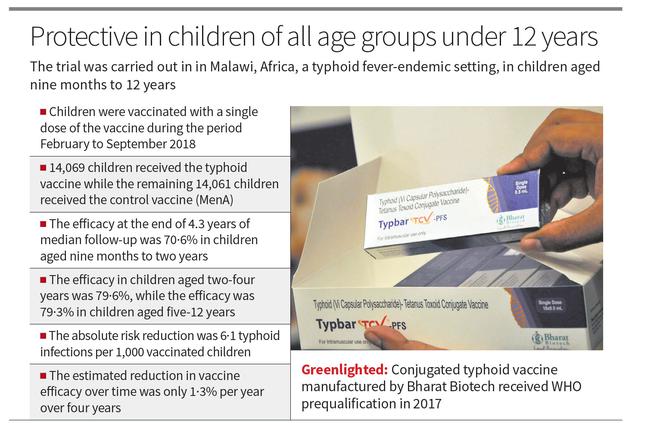A phase-3 trial in children aged between nine months and 12 years carried out in Malawi, Africa, which is a typhoid fever-endemic setting, has shown that efficacy of the Hyderabad-based Bharat Biotech’s conjugate typhoid toxoid vaccine — Typbar — lasts for at least four years. The efficacy of the vaccine was seen in children of all age groups studied. Children were vaccinated with a single dose of the vaccine during the period February to September 2018.
In 2019, there were an estimated 9·24 million typhoid cases and 1,10,000 deaths across the world. The majority of the typhoid cases and deaths in 2019 occurred in South-East Asia and Africa.
Healthy children aged nine months to 12 years were randomly assigned to receive either Bharat Biotech’s conjugate typhoid vaccine (intervention group) or meningococcal A conjugate (MenA) vaccine (control arm). Both researchers involved in the trial and the trial participants were not aware who received the typhoid vaccine and who received the MenA meningococcal vaccine. In total, 28,130 children were recruited for the trial, and 14,069 children received the typhoid vaccine while the remaining 14,061 children received the control vaccine (MenA).
This is the first randomised, controlled, double-blind trial that has been undertaken to study the long-term efficacy of a single dose of the typhoid vaccine in a typhoid fever-endemic setting in children aged nine to 12 years.

The efficacy of the vaccine at the end of 4.3 years of median follow-up was 70·6% in children aged nine months to two years. But in children aged two-four years, the efficacy was higher at 79·6%, whereas the efficacy was 79·3% in children aged five-12 years. During the follow-up period, 24 children who received the typhoid vaccine were diagnosed with typhoid fever, while 110 children in the control group were diagnosed with typhoid fever.
“Durability of protection in those younger than two years is particularly important, given our findings that the incidence of typhoid fever in the control group is similar across age bands,” the authors write. “Longer follow-up until at least 48 months has identified an increased number of cases prevented by the original single-dose vaccine intervention.” Results of the trial were published recently in the journal The Lancet.
According to the paper, the “absolute risk reduction was 6·1 typhoid infections per 1,000 vaccinated children, corresponding to a number needed to vaccinate of 163 to prevent one case of typhoid fever”. The estimated cumulative vaccine efficacy was found to be 83·4% after one year, 80·7% after two years, 80·1% after three years, 77·1% after four years, and 78·3% after 4·61 years (the longest follow-up observed) following vaccination.
In earlier trials with a shorter follow-up, Bharat Biotech’s typhoid vaccine had shown high efficacy. For instance, the efficacy of the vaccine in a trial in Malawi was 80.7% at 18-24 months, 79% at 24 months in the Nepal trial, and 85% at 18 months in the trial conducted in Bangladesh.
“Our study provides evidence that [conjugated typhoid vaccine] provides durable overall protection beyond 48 months after vaccination among children vaccinated between nine months and 12 years of age, with little decline in efficacy over time. We estimated that vaccine efficacy reduced over time by only 1·3% per year over four years,” the authors write. “The results from this longer-term trial support the high estimated cost-effectiveness of these vaccines, generated using assumptions that were based on previous trials of shorter duration.”
An accompanying Comment piece states that conjugated typhoid vaccine has “shown to induce robust immune responses in individuals older than six months”. Currently, there are two conjugated typhoid vaccines — the Typbar TCV typhoid vaccine manufactured by Bharat Biotech that received WHO prequalification in 2017, and Biological E’s Vi-CRM197 conjugated typhoid vaccine, which received WHO prequalification in 2020.
The authors note that Salmonella Typhi bacteria that causes typhoid could rebound in children aged 5-15 years after being vaccinated due to waning protection by a single dose of the vaccine; the typhoid rebound in vaccinated children is based on a mathematical model of the transmission dynamics of the bacteria. Hence, longer duration vaccine efficacy studies are needed. “Whether additional benefit could be gained with a second dose of vaccine is unknown,” they note. An immunogenicity study of a booster dose administered nearly five years after the initial dose in a subset of the youngest children who were enrolled in the latest study is currently underway in Malawi.







